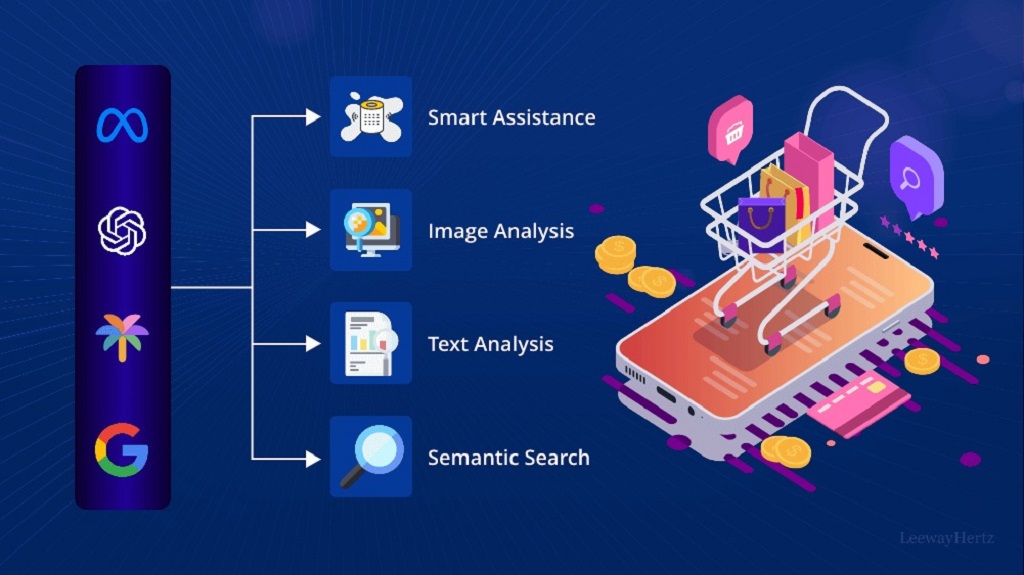Generative AI is revolutionizing the e-commerce landscape, offering businesses unprecedented opportunities to scale and thrive. By harnessing the power of AI, e-commerce stores can automate tasks, personalize customer experiences, and gain valuable insights into market trends. In this article, we will explore how to effectively leverage generative AI to scale your e-commerce store in 2025.
1. Personalized Customer Experiences:
One of the most significant advantages of generative AI is its ability to personalize customer experiences. By analyzing customer data, AI algorithms can tailor product recommendations, marketing messages, and website content to individual preferences. This level of personalization fosters stronger customer relationships, increases engagement, and drives higher conversion rates.
- AI-Powered Product Recommendations: Implement a recommendation engine that analyzes customer browsing history, purchase history, and other relevant data to suggest products they are most likely to be interested in. This can be done through personalized emails, on-site recommendations, and even social media ads.
- Chatbots and Virtual Assistants: Utilize AI-powered chatbots and virtual assistants to provide instant customer support, answer frequently asked questions, and guide customers through the purchasing process. These AI-powered helpers can be available 24/7, ensuring that customers always have access to assistance.
- Personalized Marketing Campaigns: Leverage generative AI to create targeted marketing campaigns based on customer demographics, interests, and purchase behavior. This can include personalized email campaigns, social media ads, and even retargeting campaigns.
2. Content Creation and Marketing:
Generative AI can significantly streamline content creation and marketing efforts for e-commerce businesses. By automating tasks such as product descriptions, social media posts, and email campaigns, businesses can free up valuable time and resources to focus on other strategic initiatives.
- AI-Generated Product Descriptions: Use AI to generate compelling and informative product descriptions that highlight key features and benefits. This can help improve product discoverability and increase conversion rates.
- Automated Social Media Marketing: Schedule and publish social media posts automatically using AI-powered tools. These tools can also analyze social media trends and suggest relevant content to share.
- Personalized Email Marketing: Create personalized email campaigns that resonate with individual customers. AI can help you segment your audience, personalize subject lines, and craft compelling email copy.
3. Inventory Management and Supply Chain Optimization:
Generative AI can help e-commerce businesses optimize their inventory management and supply chain processes. By analyzing historical data and market trends, AI algorithms can predict demand, optimize inventory levels, and identify potential supply chain disruptions.
- Demand Forecasting: Utilize AI-powered forecasting models to predict future demand for products. This can help you optimize inventory levels, avoid stockouts, and minimize the risk of excess inventory.
- Supply Chain Optimization: Leverage AI to identify and mitigate potential supply chain disruptions. This can include real-time tracking of shipments, identifying alternative suppliers, and optimizing transportation routes.
- Inventory Management: Implement AI-powered inventory management systems that automatically track inventory levels, generate purchase orders, and manage returns.
Read More Also: Choosing the Right Mobile Phone for Your Needs
4. Customer Service and Support:
Generative AI can significantly improve customer service and support for e-commerce businesses. By automating routine tasks and providing instant assistance, AI-powered tools can enhance the overall customer experience and build stronger customer relationships.
- Automated Customer Support: Implement AI-powered chatbots and virtual assistants to provide instant customer support. These tools can answer frequently asked questions, resolve common issues, and guide customers through the troubleshooting process.
- Sentiment Analysis: Use AI to analyze customer feedback and identify areas for improvement. This can help you identify and address customer pain points, and improve the overall customer experience.
- Personalized Customer Support: Provide personalized customer support by leveraging customer data and AI-powered insights. This can include personalized email responses, targeted offers, and proactive outreach.
5. Competitive Analysis:
Generative AI can help e-commerce businesses gain a competitive edge by providing valuable insights into market trends and competitor activities. By analyzing vast amounts of data, AI algorithms can identify opportunities and threats, and inform strategic decision-making.
- Market Trend Analysis: Use AI to analyze market trends and identify emerging opportunities. This can help you stay ahead of the curve and develop new products and services that meet the evolving needs of your customers.
- Competitor Analysis: Monitor competitor activities and identify areas for improvement. This can include analyzing competitor pricing, marketing strategies, and customer reviews.
- Competitive Intelligence: Leverage AI to gather and analyze competitive intelligence. This can help you make informed decisions about product development, pricing, and marketing strategies.
FAQ:
-
What are the key benefits of using generative AI for e-commerce?
- Personalized customer experiences
- Automated content creation and marketing
- Optimized inventory management and supply chain
- Improved customer service and support
- Competitive analysis and market insights
-
How can I get started with generative AI for my e-commerce store?
- Identify specific use cases and goals
- Choose the right AI tools and platforms
- Collect and prepare relevant data
- Train and implement AI models
- Monitor and evaluate results
- Continuously refine and improve your AI strategy
-
What are the challenges of using generative AI for e-commerce?
- Data privacy and security concerns
- Bias and fairness issues
- Lack of transparency and explainability
- Integration with existing systems
- Ethical considerations
Conclusion:
Generative AI is a powerful tool that can help e-commerce businesses scale and thrive in today’s competitive landscape. By leveraging AI-powered solutions for personalization, automation, and optimization, businesses can enhance the customer experience, improve operational efficiency, and gain a competitive edge. However, it is important to approach generative AI with a strategic mindset, carefully considering the potential challenges and ethical implications. By implementing a well-defined AI strategy and continuously monitoring and refining your approach, you can unlock the full potential of generative AI and drive sustainable growth for your e-commerce business.
